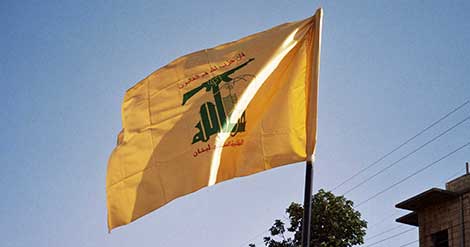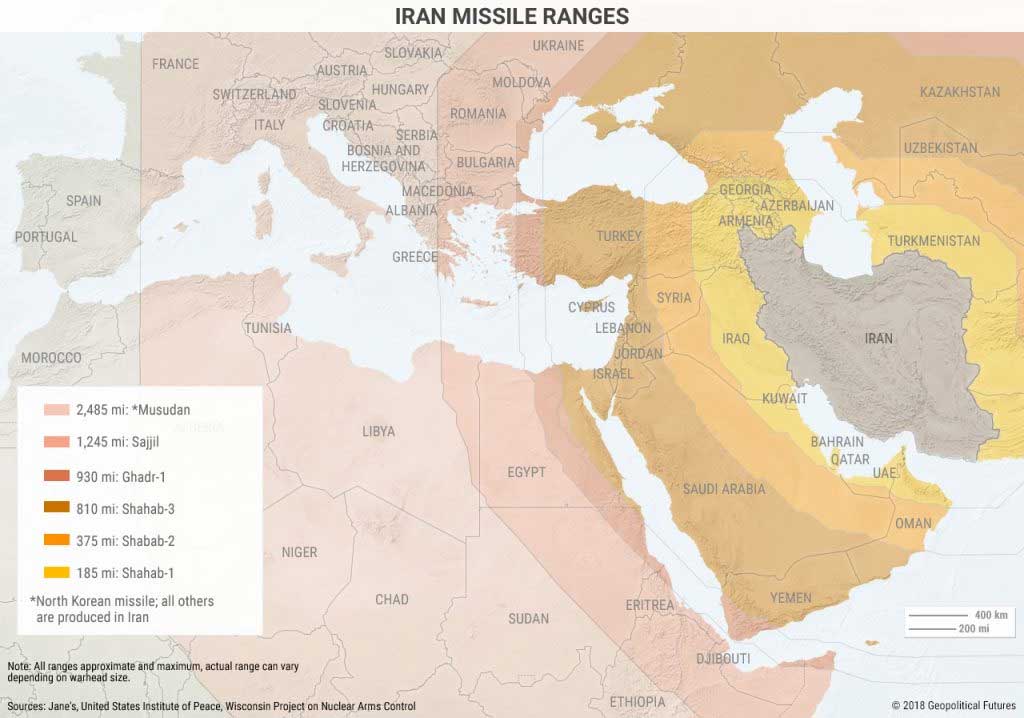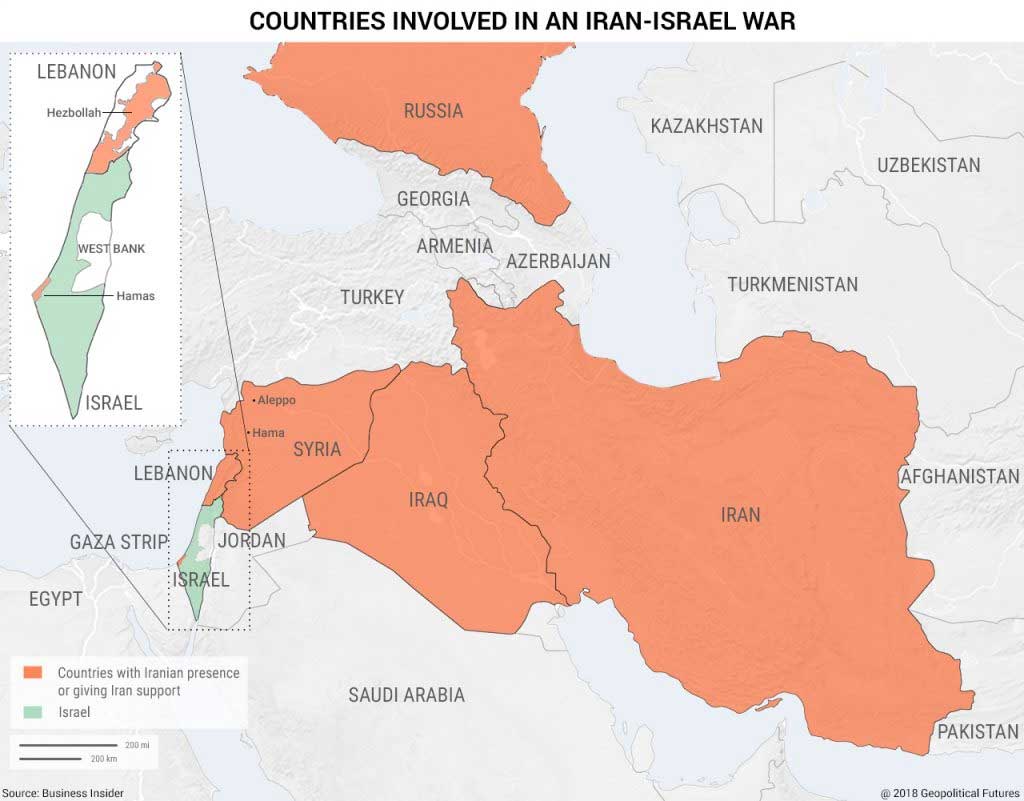
This article was originally published by Geopolitical Futures (GPF) on 3 May 2018.
Every day Iran fails to strike back makes it look weaker.
Another war between Israel and Hezbollah may well be approaching. Iran, Hezbollah’s primary patron, continues to ship weapons to the Lebanese militia despite Israel’s insistence that doing so is something it cannot allow. Israel has conducted airstrikes on Iranian and Syrian targets in the past month accordingly, but to no avail. The more aggressively Israel behaves, the sooner a direct fight with Iran will come.
Of course, the two have been engaged in a war of words for some time, but this contest has been confined to the battlefield of rhetoric for a simple if overlooked geographic reason: The two countries are too far away from each other to wage war. Now, though, Iranian bases are coming under attack, and casualties are beginning to mount, but Iran has yet to respond. Eventually it will have to, and when it does it will come in the form of Hezbollah.
That’s because Iran itself can’t do much right now. It can try to take away Israel’s advantage in the air by lobbying Russia to provide the Syrian government with S-300 missile defense systems. And indeed there are reports that Syria may soon be so equipped. According to the Russian media agency Kommersant, Moscow has already decided to offer the S-300s to Damascus, though Russia’s official position is still that it is undecided. S-300s can certainly make it more difficult for Israel to stage attacks in Syria, but they cannot stop Israel completely. And the fact that Iran has not offered its own capabilities in this regard speaks volumes.
Otherwise, Iran could, in theory, attack Israel with missiles of its own. But here, too, there are consequences. Even if all its munitions penetrated Israel’s impressive missile defense system – such systems have their drawbacks, but they would at least blunt the attack – the act would only invite a counterattack. If Iran unleashed its missiles on Israel, the United States would very likely stand with its traditional ally.

This is why Iran tends to avoid direct conflict against enemies in the region. (The last time Iran engaged directly was the Iran-Iraq War, which ended in a bloody stalemate.) Its preferred method of fighting is through the empowerment of proxy groups. Iran provides weapons, money and political cover. In return, it gets plausible deniability. The disadvantage of proxies is that their allegiance has limits. In Iraq, for example, Iran-backed Shiite militias played a crucial role in weakening the Islamic State, and though they now give Iran notable leverage inside Iraq, they can’t change the fact that Iraq is largely populated by Arab Iraqis who have no desire to become subjects of a Persian vassal state.

Iran, then, has only two options in responding to Israeli attacks: Hamas and Hezbollah. Hamas can be deployed to distract Israel, but it cannot seriously threaten it. The Gaza Strip is a densely populated and isolated piece of land that Israel has proved capable of containing. Giving Hamas money and encouraging it to protest at the Israeli border may annoy Israel, but it is hardly a viable deterrent to Israeli attacks. Hezbollah is the far more likely Iranian pawn in this scenario. It is a highly capable albeit small fighting force located right on Israel’s northern border, and, having acquitted itself well in the 2006 Israel-Hezbollah war, it has been the chief concern of the Israel Defense Forces.
But Hezbollah has its limitations too. It has been bogged down in Syria fighting for Bashar Assad since 2012, a move that provoked Lebanese Shiite protests and, if some reports are to be believed, dissension within Hezbollah itself. Hezbollah has gained tactical experience in Syria, but with experience comes exhaustion. The government in Damascus has yet to suppress the rebellion, and for all the years it has spent fighting, Hezbollah has not had the time to rest, regroup and take stock of what it has learned. The group, moreover, has lost some of its best fighters in the Syrian war and has had to ease its recruiting standards to refill its ranks. Asking Hezbollah to start a major conflict with Israel on the heels of its campaign in Syria may be asking too much. The Israeli attack that would surely follow could degrade not just Hezbollah’s numbers but its legitimacy in Lebanon as well, reducing its value as a proxy group in the first place.
Iran, then, is in a bit of a quandary. It has few good options for reprisal, but every day it fails to strike back makes it look weaker. It’s unclear how many Iranians died in Israeli strikes in Syria on April 29 – the lowest figure, reported by The New York Times, was 11. Castigating Israel and then failing to respond when it attacks Iranian citizens is not a good look for an administration struggling to maintain its grip at home.
Israel, for its part, appears to be making all the necessary preparations. According to NBC News, three U.S. officials said Israeli F-15s were responsible for last weekend’s attack against Syrian government targets in Hama and Aleppo. Haaretz reported that the officials also suggested that Israel “seems to be preparing for open warfare with Iran.” Meanwhile, reports in The New York Times and other Western news agencies cite a new law that grants the Israeli prime minister and defense minister the authority in “extreme circumstances” to declare war without consulting the security Cabinet as evidence that the Israeli government is readying for hostilities. And Israeli Prime Minister Benjamin Netanyahu’s recent presentation, in which he accused Iran of lying to the United States to get favorable terms in the Iran nuclear deal, could be interpreted as much as a battle cry as a plea for U.S. President Donald Trump to scrap the deal.
These reports make it sound like an Israeli-Iranian war is imminent, but by simple dint of geography, Iran and Israel cannot wage a conventional war against each other. Even so, the greater a foothold Iran establishes in Syria, the greater the threat it poses to Israel. For now, Israel is content to pick off Iranian weapons convoys intended for Hezbollah from the sky. The more Iranian targets it hits, though, the more it backs Iran into a corner, and the more pressure Iran will put on Hezbollah to fulfill its end of the proxy bargain. If Iran decides a military response to Israel is necessary, the hammer will fall in northern Israel, and if Israel learned anything from its 2006 fight with Hezbollah, it will know that this is not the type of enemy that can be defeated from the air – or one that will go down without causing some casualties of its own. Every Israeli strike in Syria against Iranian targets brings a second Israel-Hezbollah war that much closer.
About the Author
Jacob L. Shapiro is Director of Analyiss at Geopolitical Futures.
For more information on issues and events that shape our world, please visit the CSS website.


One reply on “The Next Israeli War”
This are just rumors But i hope that both sides knows that there has never been a good war.